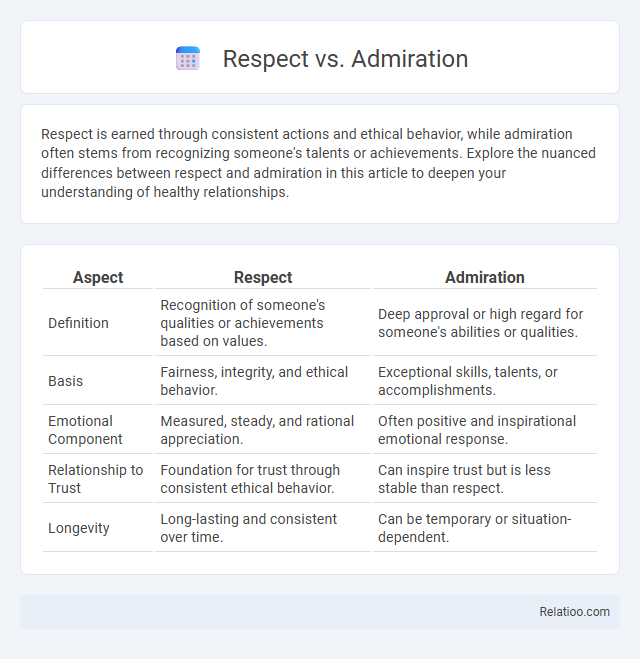Respect is earned through consistent actions and ethical behavior, while admiration often stems from recognizing someone's talents or achievements. Explore the nuanced differences between respect and admiration in this article to deepen your understanding of healthy relationships.
Table of Comparison
| Aspect | Respect | Admiration |
|---|---|---|
| Definition | Recognition of someone's qualities or achievements based on values. | Deep approval or high regard for someone's abilities or qualities. |
| Basis | Fairness, integrity, and ethical behavior. | Exceptional skills, talents, or accomplishments. |
| Emotional Component | Measured, steady, and rational appreciation. | Often positive and inspirational emotional response. |
| Relationship to Trust | Foundation for trust through consistent ethical behavior. | Can inspire trust but is less stable than respect. |
| Longevity | Long-lasting and consistent over time. | Can be temporary or situation-dependent. |
Understanding Respect: Definition and Significance
Respect is the recognition of someone's inherent worth and dignity, fostering positive social interactions and trust. It involves acknowledging others' rights, feelings, and perspectives, which is fundamental in building healthy relationships and communities. Understanding respect emphasizes its role in promoting mutual understanding and cooperation across diverse social and professional settings.
What is Admiration? Key Concepts Explained
Admiration is an emotional response characterized by recognizing and valuing someone's qualities, achievements, or talents, often inspiring motivation or emulation. Key concepts of admiration include acknowledgment of excellence, positive evaluation, and a desire to learn or grow from the admired individual's attributes. Unlike respect, which is grounded in recognizing rights or status, admiration specifically centers on appreciating exceptional traits or accomplishments.
Core Differences Between Respect and Admiration
Respect involves recognizing someone's abilities, qualities, or achievements based on principles, ethics, or social norms, while admiration focuses on a deep appreciation or emotional response to someone's talents, accomplishments, or character. You may respect someone for their integrity or professionalism but admire them for their creativity or courage. The core difference lies in respect being an acknowledgment often tied to moral or social values, whereas admiration is more about personal feelings of esteem and inspiration.
The Psychological Foundations of Respect
Respect originates from recognizing another person's inherent worth and dignity, deeply rooted in social and moral psychology. It involves cognitive appraisals of competence, integrity, and shared values, activating neural pathways associated with social bonding and empathy. Unlike admiration, which often centers on exceptional achievements or talents, respect emphasizes equitable recognition and acknowledgment of fundamental human rights and roles.
How Admiration Shapes Our Perceptions
Admiration shapes your perceptions by highlighting qualities that inspire respect, such as integrity, skill, and dedication, making you more likely to value and emulate those traits. Unlike respect, which acknowledges competence and authority, admiration involves an emotional connection that elevates the admired individual's influence on your beliefs and motivations. This emotional impact of admiration often drives personal growth and deepens your appreciation for exceptional character and achievements.
Building Respect: Practical Strategies
Building respect requires consistent actions that demonstrate integrity, reliability, and empathy in your interactions with others. You can foster respect by actively listening, honoring commitments, and acknowledging others' contributions to create trust and genuine connections. Practical strategies include setting clear boundaries, providing constructive feedback, and leading by example to inspire respect in both personal and professional relationships.
Cultivating Admiration: Influences and Examples
Cultivating admiration involves recognizing and appreciating qualities such as integrity, competence, and kindness in others, which fosters positive relationships and personal growth. Influences on admiration include role models, life experiences, and cultural values that highlight exemplary behaviors and achievements. Examples of admiration can be seen in mentorship dynamics, where learners respect and aspire to emulate their mentors' expertise and character.
Respect vs Admiration in Relationships
Respect forms the foundation of healthy relationships by fostering trust, understanding, and valuing boundaries, while admiration involves appreciating specific qualities or achievements in your partner. Your relationship thrives when mutual respect encourages open communication and emotional safety, whereas admiration can deepen connection through positive reinforcement and shared appreciation. Balancing respect and admiration allows partners to build both stability and inspiration within their bond.
Social and Cultural Perspectives on Respect and Admiration
Respect in social and cultural contexts often signifies recognizing someone's inherent dignity and social roles, fostering harmonious community interactions. Admiration typically reflects a value judgment of someone's qualities or achievements, shaping cultural ideals and role models within societies. Both concepts influence social cohesion, but respect promotes mutual understanding while admiration drives aspirational behavior.
Why Distinguishing Respect from Admiration Matters
Understanding the difference between respect, admiration, and adulation is crucial because respect is based on recognizing someone's inherent worth and ethical behavior, while admiration focuses on appreciating their skills or achievements. Distinguishing respect from admiration helps you build genuine relationships grounded in mutual values rather than superficial qualities. This clarity prevents confusion and promotes healthier social and professional interactions.

Infographic: Respect vs Admiration
 relatioo.com
relatioo.com